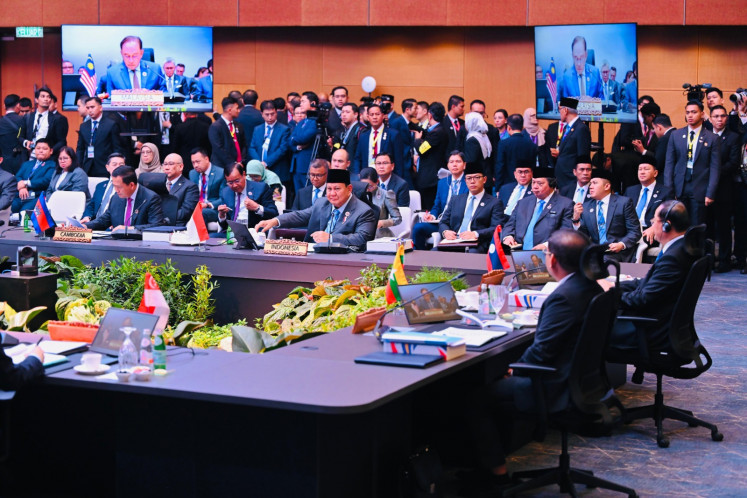Popular Reads
Top Results
Can't find what you're looking for?
View all search resultsPopular Reads
Top Results
Can't find what you're looking for?
View all search resultsWhat Australians think about America and China
Australiaâs strategic thinkers are preoccupied by the question of whether Australia will one day have to choose between its great strategic ally, the United States and its leading economic partner, China
Change text size
Gift Premium Articles
to Anyone
A
ustralia's strategic thinkers are preoccupied by the question of whether Australia will one day have to choose between its great strategic ally, the United States and its leading economic partner, China.
Managing the Australia-US-China strategic triangle ' and preventing the triangle from turning toxic ' is increasingly the alpha and omega of Australian foreign policy.
According to the 2013 Lowy Institute Poll (www.lowyinstitute.org/publications/lowy-institute-poll-2013), however, most Australians are unconvinced they will have to choose, even if they are wary
of what a rising China means for their security.
The Lowy Institute has been asking Australians about their attitudes to the United States and China for a number of years.
In 2013, support for Australia's alliance with the United States remains rock-solid at 82 percent. In fact, support for the basing of US troops in Australia has risen six points from last year, to 61 percent.
This is a strong result given that US bases has long been regarded as 'a bridge too far' in Australian politics. We can speculate that an even greater majority of Australians would be comfortable with the current practice of rotating
US Marines through Darwin, which does not entail a permanent American base.
There are limits to Australian support for US military action, however. Only 48 percent agree that Canberra should support US military action in the Middle East, and even fewer (38 percent) say that Australia should follow the United States into a military conflict in Asia.
A full three-quarters of Australians agree with the proposition that 'Australia should only support US military action if it is authorized by the United Nations'. Perhaps after a decade of participating in US military endeavors in the Middle East, Australians are fatigued. Sixty-one per cent of Australians now consider that the Afghanistan war was 'not worth fighting'.
Nevertheless, Australians' affinity for their American cousins remains noticeable. This affinity is surely based in large part on the commonalities of history, language and values between the two countries ' as well as a hardheaded view that Australia's security
depends on the alliance.
We know that this affinity is not based on economics, because a staggering three-quarters of Australians think that China's is the most important economy to Australia. Only 16 percent of Australians nominated the US economy as the most important economy to Australia.
When it comes to China, this year's Lowy Institute Poll detected a rise in wariness. The Poll's 'thermometer' rating shows that warmth of feeling toward China has dropped by 5 points to a coolish 54 degrees.
These feelings are significantly cooler than they were a few years ago. The diminution of Chinese 'soft power', which has been noted around the world, has been felt in Australia too.
Fifty-seven percent of Australians also say the government allows too much investment from China.
Most Australians seem to be 'declinists'. Sixty-one per cent say that China will eventually replace the United States as the world's leading superpower.
The same question has been asked in a range of other countries in the Pew Global Attitudes Survey. Significantly, more Australians
this year are convinced of this eventuality than any other country surveyed recently by Pew, including China itself.
Yet 41 percent of Australians also think it is likely that China will become a military threat to Australia in the next 20 years.
This is a striking result: a significant minority of Australians believe that our largest economic partner is likely to become a military threat in the medium term.
In sum, Australians privilege the United States when it comes to security and China when it comes to prosperity.
For the first time this year, we asked Australians to choose which relationship was more important to Australia ' China or the United States. Forty-eight percent of Australians nominated the United States and 37 percent said China.
As it happens, though, most Australians think they may not have to choose. The vast majority (87 percent) believe it is possible for Australia to have a good relationship with China and the United States at the same time.
This sets the bar extremely high for those policy makers in Canberra charged with managing the Australia-US-China strategic triangle, who tend not to be quite so optimistic.
The writer is the executive director of the Lowy Institute (www.lowyinstitute.org) in Sydney, Australia. He is also the author of Rendezvous with Destiny: How Franklin D. Roosevelt and Five Extraordinary Men Took America into the War and into the World (The Penguin Press, 2013).










